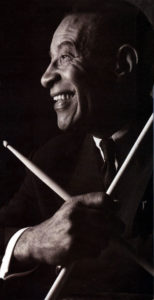
Max Roach
Max Roach was born on this date in 1924. He was a Black bebop/hard bop jazz percussionist, drummer, and composer.
Maxwell Lemuel Roach was born in Newland, N.C., to Alphonse and Cressie Roach. His family moved to Brooklyn when he was four years old. A player piano left by the previous NY tenants gave Roach his musical introduction, and he started to play bugle in parade orchestras at a young age. His mother was a gospel singer, which led Roach, at 10, to play drums in some gospel bands. Roach performed his first big-time gig in New York City at 16, substituting for Sonny Greer with the Duke Ellington Orchestra.
In 1942, Roach started to go out in the jazz clubs of 52nd Street and at 78th Street & Broadway for Georgie Jay's Taproom (playing with schoolmate Cecil Payne). He was one of the first drummers (along with Kenny Clarke) to play in the bebop style and performed in bands led by Dizzy Gillespie, Charlie Parker, Thelonious Monk, Coleman Hawkins, Bud Powell, and Miles Davis. Roach played on many of Parker's most important records, including the Savoy 1945 session. He continued to play as a freelancer while studying composition at the Manhattan School of Music, where he graduated in 1952.
He had two children, Daryl and Maxine, from his first marriage with Mildred Roach. In 1954, he met singer Barbara Jai (Johnson) and had another son, Raoul Jordu. In 1960, he composed the “We Insist! - Freedom Now” suite with lyrics by Oscar Brown Jr. after being invited to contribute to commemorations of the 100th anniversary of the Emancipation Proclamation. Using his musical abilities to comment on the African American experience was a significant part of his career. Because of this, Roach was blacklisted by the American recording industry for a period in the 1960s.
Roach was also married to the singer Abbey Lincoln, who had performed on several of Roach's albums. Twin daughters Ayodele and Dara Rasheeda were later born to Roach and his third wife, Janus Adams Roach. In 1966, with his album "Drums Unlimited,” he proved that drums could be a solo instrument capable of playing themes, variations, and rhythmically cohesive phrases. Another important record Roach made is the classic “Money Jungle,” 1962, with Charles Mingus and Duke Ellington.
During the 1970s, Roach formed a unique musical organization, "M'Boom," a percussion orchestra. Each member composed and performed many percussion instruments. Members included Fred King, Joe Chambers, Warren Smith, Freddie Waits, Roy Brooks, Omar Clay, Ray Mantilla, Francisco Mora, and Eli Fountain.
In 1972, he joined the faculty of the University of Massachusetts at Amherst. Not content to expand on the musical territory he had already known, Roach spent the decades of the 1980s and 1990s continually finding new ways to express his musical expression and presentation. In the early 1980s, he began presenting solo concerts, proving that this multi-percussion instrument, in the hands of such a great master, could fulfill the demands of solo performance and be entirely satisfying to an audience. He created memorable compositions in these concerts. Bay State, a Japanese label, released a solo record. One of these solo concerts also includes filming a recording date for "Chattahoochee Red," featuring his working quartet with Odean Pope, Cecil Bridgewater, and Calvin Hill.
In the early 2000s, Roach became less active due to the onset of hydrocephalus-related complications. Renowned throughout his performing life, Roach won many honors. Some of them include a MacArthur Foundation "genius" grant, being cited as a Commander of the Order of Arts and Letters in France, twice being awarded the French Grand Prix, du Disque, being elected to the International Percussive Art Society's Hall of Fame, and being in the Downbeat Magazine Hall of Fame.
He was awarded the Harvard Jazz Master's and eight honorary doctorate degrees, including degrees awarded by the University of Bologna, Italy, and Columbia University. He worked with many of the greatest jazz musicians in the world. He is widely considered one of the most important drummers in jazz history. Max Roach died on August 16, 2007, at his home.